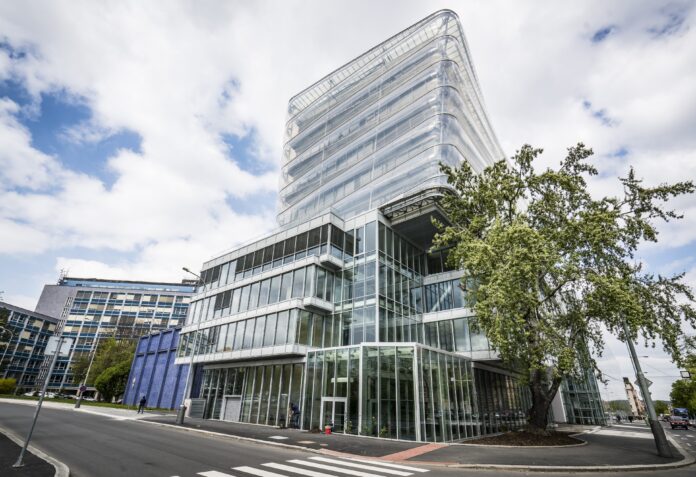The CLARA Centre, which focuses on the intersection of artificial intelligence, quantum computing and neuroscience research, has received key funding to upgrade the facilities involved. The total budget is CZK 1.057 billion, of which the European Union has already approved the provision of almost EUR 15 million (CZK 357 million) from the Horizon Europe programme last year. The Czech Ministry of Education, Youth and Sports (MEYS) has now decided on complementary funding for the second part of the budget from the Jan Amos Komenský Operational Programme (OP JAK) with eligible expenditures totalling nearly CZK 700 million (EUR 26.4 mil.), of which the subsidy is CZK 665 million (EUR 27.9 mil). The purpose of this part of the budget is mainly to modernise laboratories and build unique infrastructure at research sites in Prague, Brno and Ostrava.
|
CIIRC ČVUT
|
IT4Innovations
|
ICRC
|
Launched last November, the CLARA project aims to create an international centre of excellence that will revolutionise the use of supercomputers and quantum computers to combine advanced computational methods – quantum computing, artificial intelligence and high-performance computing – with neuroscience research, enabling the development of new diagnostic and therapeutic methods for neurodegenerative diseases. CLARA’s main focus is on Alzheimer’s disease, and to do this it needs to process large-scale biological and clinical data. It will use the latest technologies to connect fragmented knowledge and accelerate innovation. Neurodegenerative diseases such as Alzheimer’s and Parkinson’s now affect more than 50 million people worldwide and are expected to more than double in the coming decades. CLARA thus opens the way to new therapeutic solutions to mitigate the impact of these diseases on society.
The CLARA project brings together excellent Czech institutions with world-leading institutes in Germany and France. The grant from MEYS is intended for the modernisation of the laboratories of the Czech CLARA partners, which are INDRC (International Neurodegenerative Disorders Research Center), which also coordinates the project, VŠB-TUO (VŠB – Technical University Ostrava), CIIRC CTU (Czech Institute of Informatics, Robotics and Cybernetics of the Czech Technical University in Prague), and ICRC (International Clinical Research Centre).
Over the next four years, these partners will focus on building a unique distributed computing and data infrastructure, the CLARA Testbed, for high-performance and quantum computing in the field of brain neurodegeneration and related scientific topics. Of the CZK 700 million, 73% will be allocated to acquiring equipment and long-term tangible assets. This will lead to the creation of a unique platform for research into breakthrough applications of artificial intelligence and quantum computing methods in the field of neuroscience to rapidly transfer scientific knowledge into clinical practice. The eligible expenditures from the OP JAK budget are distributed among the partners as follows: INDRC 20 million CZK (EUR 0.85 mil), VŠB-TUO 331 million CZK, VŠB-TUO 331 million CZK (EUR 13.9 mil), CIIRC CTU 149 million CZK (EUR 6.3 mil), and ICRC 200 million CZK (EUR 8.4 mil).
„Thanks to this grant, we can expand our IT infrastructure and significantly support research activities in the field of neurodegenerative diseases. Modern technologies will allow us to efficiently analyse huge amounts of data and find new ways of interventions towards optimal brain performance,“ said Mgr. Lenka Uldrijanová, Executive Director of INDRC.
INDRC will focus on the expansion of IT infrastructure, which will be acquired and integrated, both functionally and locally, with the newly modernized computing cluster at CIIRC CTU. The CTU computing cluster will be used mainly for solving artificial intelligence tasks using deep neural networks. „One example is the development of entirely new neural models that enable significantly faster computations of protein interactions with other biomolecules in the brain,“ said Dr. Josef Šivic, head of the IMPACT research group at CIIRC CTU specialising in intelligent machine perception. In addition, CIIRC CTU will also upgrade its assistive technology laboratory equipped with sensing technologies for monitoring human physiological data and assisted living environments.
„The modernisation of the computing cluster and the expansion of our IT capabilities will enable the integration of artificial intelligence with neuroscience at an entirely new level. At the same time, we will create unique laboratories of assistive technologies that will support not only scientific research but also practical applications,“ said Prof. Vladimír Mařík, Scientific Director of CIIRC CTU. As part of the CLARA project, a joint laboratory called the CLARA Collaboratorium will also be established, serving as a central hub for effective information sharing with the general public. It will contribute to knowledge exchange between the academic and business sectors and foster public engagement through educational events and co-creation activities.
The National Supercomputing Centre IT4Innovations, which is part of the VŠB-TUO, will be responsible for building and operating the computing and data infrastructure to support research into neurodegenerative diseases, the so-called CLARA Testbed, together with the Bavarian supercomputing centre LRZ.
„In the first phase, we plan to link the existing supercomputer Karolina and the quantum computer VLQ, operated by the LUMI-Q consortium, together with the computing resources at LRZ. By 2026 at the latest, we are also planning to acquire a completely new CLARA supercomputer specialised in artificial intelligence computing, especially for training deep neural networks, and possibly for quantum computing simulations. This will significantly strengthen the research teams of the CLARA centre in fulfilling their research goals,“ said doc. Vít Vondrák, Director of the National Supercomputing Centre IT4Innovation at the Technical University of Ostrava (VŠB-TUO).
The project will also acquire a high-capacity data repository that will be used to store data during the active phase of processing and as a data source for learning new neural network models. „This repository will also become a key element of the distributed data infrastructure that will be used to collect and provide large-scale data within the CLARA Testbed and will be open to other external data sources. The repository will also play the role of an intermediate link between computational capacities and data repositories, enabling the preparation and publication of the centre’s outputs with respect to the principles of open science and FAIR access to data,“ adds Vondrák.
In Brno, the funding will be used for new technologies for the recombinant preparation laboratory focused on protein analysis, biophysical analyses, and a laboratory for research on brain electrophysiology. They will also acquire new computing resources to run tools and databases for computer-aided protein design.
„We are investing in a powerful computing cluster that will enable the analysis of complex biological data and virtual drug screening,“ explains Prof. Michal Masařík, Head of ICRC, a joint workplace of the St. Anne’s University Hospital Brno (FNUSA) and the Faculty of Medicine at Masaryk University. „This will allow us to test millions of organic molecules for their ability to bind to Apolipoprotein E and prevent its harmful aggregation, which contributes to the degeneration of brain cells.“ A key investment will be a laboratory robot for handling protein samples, which will also be crucial for ICRC scientists. „It offers maximum precision and speed,“ adds Masařík. The grant will also enable Brno-based scientists to acquire innovative biophysical techniques developed in Oxford and Copenhagen.
CLARA aims to discover new possibilities for the treatment and prevention of neurodegenerative diseases while contributing to the solutions of global challenges faced by Europe. The Centre will become a driver of innovation with a broad societal and economic impact. The research carried out at CLARA will be essential for developing new treatment methods and procedures that can improve the quality of life for millions of people worldwide. The CLARA research infrastructure will serve not only Czech scientists but also international partners and may become a model for other research centres in Europe and beyond.
CLARA has the potential to become a leader in neurodegenerative disease research not only in the Czech Republic but also in Europe and to strengthen the global competitiveness of Czech science. By combining cutting-edge technologies, interdisciplinary research and international collaboration, CLARA will become a key player in the global fight against diseases such as Alzheimer’s disease.
This project is supported by the European Union’s Horizon Europe Framework Programme under grant agreement number 101136607, and by the European Union and the Ministry of Education and Science under the Operational Programme Jan Amos Komenský (OP JAK), project number CZ.02.01.01/00/23_029/0008437.






